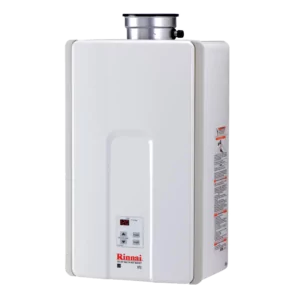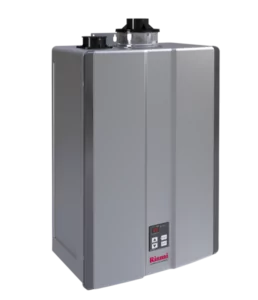These days, energy-efficient on-demand water heaters are becoming more and more popular as they are now the better alternative to using storage tank water heaters. However, with every technology, there are advantages as well as disadvantages to it.
Tankless water heaters are also known as instantaneous water heaters or on-demand water heaters because they are able to provide hot water when needed. Unlike traditional storage-tank water heaters which require a tank where preheated water is stored, tankless water heaters only heat water when the tap is turned on. This is not only energy-efficient, but it also eliminates the need for a storage tank as well as the room where the tank is stored.
On-demand water heaters generate their heat either through electricity or through gas or propane. Gas models are found to be more efficient, roughly 22 percent more efficient than electric models though. Translating this efficiency will result in around 75 dollar savings on annual utility bills. This is, of course, if the home uses around 77 gallons of heated water on a daily basis.
There are basically two types of tankless water heaters – Point of Use and Whole House Use.
Point of Use – these are small water heating systems that heat only around a one-tap location. For example, you can have one installed for use on the shower, and have another one installed for use on the kitchen sink. Their small form factor enables them to be hidden under the kitchen sink or hung on the wall of the shower room.
Whole House Use – these are larger water heating systems that are designed to provide enough heated water for an entire house. These systems are typically or ideally situated in the utility room or garage for that matter. Whole House Use water heaters have a longer lag time as compared to Point of Use water heaters. Lag time translates to the time the hot water travels from the heating system to the faucet based on its distance. Longer distances mean longer lag times.
The Advantage of a Tankless Water Heating System:
Continuous Hot Water – since tankless water heaters are not limited by the capacity of the tank, they are able to provide endless amounts of hot water. This is possible as water is heated as it passes through the heating coils of the water heater. It can be said that a tankless water heater will never run out of heated water.
Size – tankless water heaters have a smaller form factor as compared to other water heating equipment. Their smaller size allows them to be hung on walls or underneath sinks. Their size not only allows them to occupy lesser space but because of this size, they can be tucked away at areas where they practically do not occupy any space in the home.
Efficiency – these tankless heating systems are very cost-effective as they only use energy when there is a need for the heated water. This dramatically reduces the cost of utility bills as it does not need to reheat water at a preset temperature when it is not in use as compared to storage tank water heaters.
Ease of Installation – these water heating systems are very easy to install as compared to when using a tank system. The utility guy just needs to attach it in between the water supply and the tap along with a few electrical wirings and it is done. The best part about them is that you do not need to allot a significant amount of space as tank systems do.
Less Risk to Water Damage – since these water heating systems operate without a tank, you do not have to worry about storage tank deterioration or fitting failure which will result in leaking.
Life Expectancy – storage tank water heating system, with enough care and maintenance, will have a life expectancy of around 12 years. Tankless systems, on the other hand, will have around 20 years of life expectancy, something which is substantially more than a storage tank system.
The Disadvantage of Using a Tankless Water Heating System:
Lag Time – this is perhaps the most common complaint that people have over on-demand water heaters. Starting up the tap or faucet does not immediately start with heated water running and you need to wait for several seconds to maybe a minute until the desired temperature is met. Since this is often the case, owners of on-demand systems should not expect heated water when they turn on their faucets or showers.
Irregular Use – the repeated on and off use will have an interval of hot and cold water. Although this does not pose a problem during continuous usage or pose as a damaging effect to the unit, there are individuals who prefer to have a steady water temperature in their faucet whether they frequently turn it on and off.
Unit Cost – the actual cost of an on-demand water heater unit far more than you’ll pay for a regular storage-tank water heater. This is mostly because of the technology involved with on-demand units as they are equipped with electronics and a ventilating system.
Sources of Heat – storage tank systems are able to utilize solar energy as a method of heating or pre-heating of water. They can also utilize geothermal, electricity, and natural gas as a means of energy to generate the heat needed to make hot water. Non-tank systems are only able to use electricity, gas, and propane as a means of energy.
Just like every type of system, there are always advantages and disadvantages, and this does not exclude the tankless water heating system. If you are considering replacing your water heating system, you must first review whether the change to such a system will be beneficial for you, or if the disadvantage outweighs its advantages. If you are switching to a tankless system because you want to save on utility bills, then you’re making a good choice.
